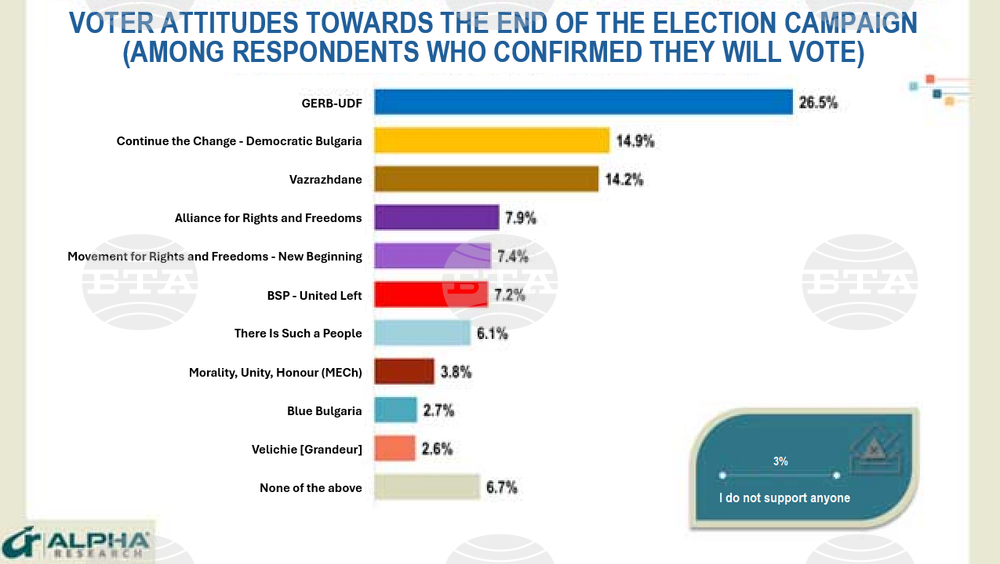site.btaUPDATED One Week before Elections Poll Registers Weak Campaign Impact on Voters


A week before the seventh snap elections, a nationally representative poll by the Alpha Research agency registered a weak response to the campaign among voters, another low turnout, and a high probability of continued strength of the dividing lines in the 51st parliament, said the agency which published the results of the survey on its website.
Alpha Research conducted the poll with its own funds between October 20 and 23 among 1,000 adult Bulgarians countrywide, using two-stage stratified random sampling with a quota on the main socio-demographic characteristics. Data was collected through direct standardized tablet interview at the homes of the respondents. The polling toolkit reflects voluntarily shared evaluations, attitudes and intentions to participate in the October 27 vote, but the share of bought, controlled or coerced votes remains outside its scope.
Campaign assessment and expected turnout
Some 30%-32% of respondents said they were ready to go to the polls. Judging by people's assessments, we are at the end of another sluggish election campaign, focused on tightening the ranks of hard-liners, pollsters say. According to 56% of adult citizens of the country in their communities, there is no sign that elections are coming. Against this background of apathy, what is truly disturbing is the feedback on the electoral atmosphere given by just over a quarter of respondents, according to whom in their surroundings the power of arguments competes with the arguments of force: for 14% (mostly residents of smaller settlements in areas with mixed populations) the campaign has been tense, with conflicts between party representatives; another 13% report attempts to attract support through material, financial incentives, through direct, or indirect pressure. Only 17% reported a positive experience of a peaceful campaign, with meetings and talks of representatives of the different political parties.
With apathy or coercion dominating the country, no serious signs of voter mobilisation were registered, Alpha Research notes. Readiness to go to the polls was declared by 30%-32% of respondents, which means a turnout of about 2 million voters. In some places it is possible to mobilise a protest vote, which could slightly increase participation, but there is no indication that a more serious wave could be raised, experts say.
Only the hardcore supporters of the parties remain mobilized, while the so-called electoral peripheries of wavering voters remain passive, analysts report. If the recorded low turnout is maintained, both a swap between parties in close positions and the entry into parliament of one of the formations close to the 4% barrier are possible.
Electoral support for parties and coalitions
Just as at the beginning of the campaign, so at the end of it, the voters' attitudes point to a 7-party parliament, with some likelihood of an eighth participant, Alpha Research said.
GERB-FDP have managed to achieve high mobilisation among their supporters and to secure a comfortable lead over their opponents. They are wrapping up the campaign with 26.5% support among those determined to vote and their first place is one of the few certainties in the upcoming elections.
Continue the Change - Democratic Bulgaria (CC-DB) (14,9%) and Vazrazhdane (14,2%) continue to argue for the second place. Both formations face challenges, pollsters say. They say CC-DB has not yet managed to win back the support of voters who withdrew in June. The Vazrazhdane party is facing competition from formations positioning themselves in the radical-populist niche, such as There Is Such a People (TISP) and Morality, Unity, Honour (MECh) party, Alpha Research added.
The fiercest battles appear to be between the two wings of the Movement for Rights and Freedoms (MRF), experts say. A week before the vote, the positions of the A. Dogan's Alliance for Rights and Freedoms Coalition (7.9%) and the wing around D. Peevski's MRF - New Beginning Coalition (7.4%) are almost neck and neck. The Alliance for Rights and Freedoms Coalition has a larger pool of swing voters, the MRF - New Beginning Coalition has stronger institutional positions among the mayors of the settlements where the vote of Bulgarian Turks and Muslims is concentrated, Alpha Research commented and pointed out that it remains unclear how the vote abroad will develop.
The BSP - United Left Coalition (7.2%) and TISP (6.1%) are the other two participants that complete the picture of the seven-party parliament. However, both formations register relatively lower levels of mobilisation, volatility and potential dynamics in support, the pollsters report.
Below the 4% barrier, but closest to it, are the Morality, Unity, Honour (MECh) party (3.8%), Blue Bulgaria (2.7%) and Velichie (Grandeur) Party (2.6%). Although a record low of 80,000 votes may be needed to enter parliament, it is unlikely that two parties will be able to muster them, experts say. Only one of these formations is more likely to harness the migrant emotional and protest vote, they say. An option for protest-minded voters remains the "I don't support anyone" option, to which about 3% of those who decided to go to the polls are heading.
In conclusion, in a seven-party parliament GERB and CC-DB could be close to a majority and seek the support of a third partner to form a government, Alpha Research said. Given the previous declarations by the two formations, the situation seems increasingly unlikely to be resolved. However, voters' expectations are unequivocal about finding an option for regular government. A new failure would delegitimise the entire political class, pollsters say.
/BR/
news.modal.header
news.modal.text